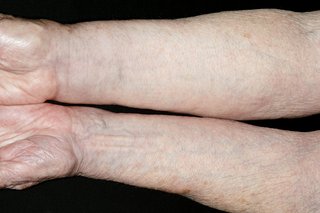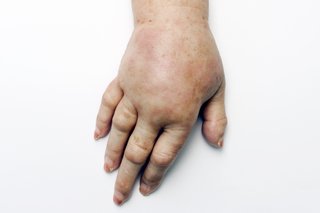Swelling in the arms or hands often goes away on its own. See a GP if it does not get better in a few days.
Common causes of swollen arms and hands
Swelling in the arms and hands is often caused by a build-up of fluid in these areas, called oedema.
Oedema is usually caused by:
- staying in the same position for too long
- eating too much salty food
- being overweight
- being pregnant – read about swollen ankles, feet and fingers in pregnancy
- taking certain medicines – such as some blood pressure medicines, contraceptive pills, antidepressants or steroids
Oedema can also be caused by:
- an injury – such as a strain or sprain
- sudden changes in temperature – such as very hot weather
- an insect bite or sting
- problems with your kidneys, liver or heart
- a blood clot
- an infection
Check if you have oedema
Symptoms of oedema include:

DR P. MARAZZI / SCIENCE PHOTO LIBRARY

SCIENCE PHOTO LIBRARY
How to ease swelling yourself
Swelling should go away on its own, but there are some things you can try to help.
Do
-
lie down and use pillows to raise the swollen area when you can
-
move your whole arm and shoulder – try raising your hand above your head while you open and close your fist
-
massage your arm or hand towards your body using firm, but not painful, pressure – for example, start at your fingertips and massage towards your palm
-
get some gentle exercise, like walking, to improve your blood flow
-
drink plenty of water
-
wash, dry and moisturise your arms or hands to avoid infections
Don't
-
do not stay in the same position for long periods of time
-
do not wear clothes that are too tight
Non-urgent advice: See a GP if your arm or hand is swollen and:
- it has not improved after treating it at home for a few days
- it gets worse
Urgent advice: Ask for an urgent GP appointment if:
- the swelling is only in 1 arm or hand and there's no obvious cause, such as an injury
- the swelling is severe, painful or starts very suddenly
- the swollen area is red or feels hot to the touch
- your temperature is very high, or you feel hot and shivery
- you have diabetes
Immediate action required: Call 999 if:
- you feel short of breath or are struggling to breathe
- your chest feels tight, heavy or painful
You could have a blood clot in your lungs, which needs immediate treatment in hospital.
Treatment for swelling and oedema
Treatment for swelling or oedema that does not go away on its own will depend on the cause.
It may include lifestyle changes, such as losing weight or going on a low-salt diet.
Page last reviewed: 8 May 2019
Next review due: 8 May 2022
